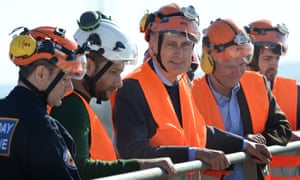The Guardian
Link
Russia is breaching all the norms of war by deliberately targeting rescue workers, schools and hospitals in Syria, the UK foreign secretary has claimed, accusing the Russians of running return raids on targets inside Syria solely to hit civilian rescue workers.
Philip Hammond levelled his charges after meeting Syrian civil defence workers in Adana, southern Turkey. The rescue workers are being trained by the Turks to extract the injured and dying from the rubble of buildings struck by Syrian regime bombs or Russian raids.
In probably his toughest condemnation of Russian tactics since Vladimir Putinsurprised the west by intervening militarily in Syria at the end of September, Hammond said: “The Russians are deliberately attacking civilians, and the evidence points to them deliberately attacking schools and hospitals and deliberately targeting rescue workers.
“If you go back for a second strike you know what you are doing.”
The west has long argued Russia is not targeting Islamic State but instead opponents of the Assad regime, but this is the furthest Hammond has gone in condemning the tactics of Russian pilots.
He said he will be raising the issue directly with the Russian foreign minister, Sergei Lavrov, in the next few days, adding that Russian military tactics were making it almost impossible to build the confidence necessary for peace talks due to start in Geneva on 25 January.
Hammond was told by the teams of civilian rescue workers in Adana that Russian bombing missions were distinct from those run by the Syrian air force since they attacked with multiple aircraft and always returned to targets 15 to 20 minutes after the initial bomb to hit the same target.
Hammond reported: “Rescue workers are no longer marking their vehicles because they believe they are being targeted deliberately. They also told me hospitals around Aleppo and Idlib have had Red Cross symbols removed because they are becoming a target for the Russians.”
Taken aback by what he was told by the group of rescue workers, trainees known as the white helmets, he continued: “We in Britain have been rightly challenged about Saudi Arabia in Yemen and why we maintain our confidence in the Saudis not breaching international law. But the much bigger story here is Russia. They are supposedly our ally sitting at the same table in the negotiations on Syria’s future, but they are targeting civilians – they should be held to account under international law.”
Hammond predicted he would get “nothing but flannel” from the Russians in response to his allegations, but said details of the attacks were being compiled, and warned if Moscow did not change its tactics it would be impossible to make any progress in peace talks in Geneva. Critical to those peace talks was a ceasefire and confidence-building measures, he said.
He said it was essential that “the Russians stop bombing civilian targets, stop using barrel bombs, stop using siege tactics and give humanitarian access to areas”.
Hammond acknowledged that crimes may have been committed by all sides in the four-year civil war, but added: “Russia is a state and it is a state that aspires to play a role as an international power sitting at the top table and it has to behave in accordance with international law.”
He said he understood why moderate Syrian forces were reluctant to to talk to Assad or Russia, but he said the moderates must engage. “The opposition would be making a mistake if it refused to engage and they have got to hear what the regime has to say,” he said
“The talks have to go ahead even if the omens are not good and it is unlikely there will be much progress. Even if they only meet for a few hours and agree to meet again in a fortnight that would be better, but there is a quite a wide gap between the agenda the opposition want to talk about and the agenda the government wants.”
Hammond again insisted Assad could not stay in power beyond six to nine months of the talks starting, adding that a ceasefire, a precondition of talks about a transitional government, could only be sold to opposition forces if it was clear Assad would go.
“If there is a clear date for his end, some of the opposition forces at least will be prepared to engage with a ceasefire ahead of his departure.”
Hammond accepted some of the moderate forces likely to be present at the talks were Islamist, but the test was whether they were prepared to take part in a democratic contest.
“There are two kinds of Islamists; there are those that say this is the word of Allah and it cannot be debated and discussed, and there are those that say they have an Islamist future for the country. But we will argue our case and put it to the people – and if we don’t win, we will keep putting our case.”


No comments:
Post a Comment